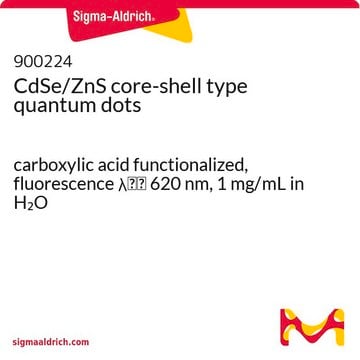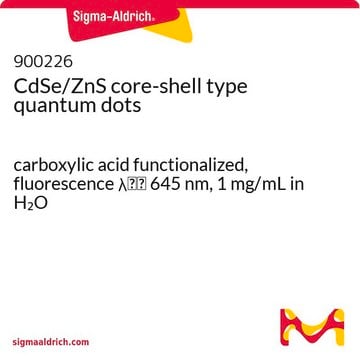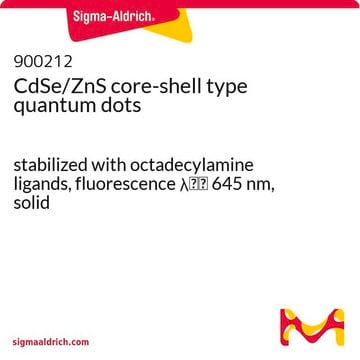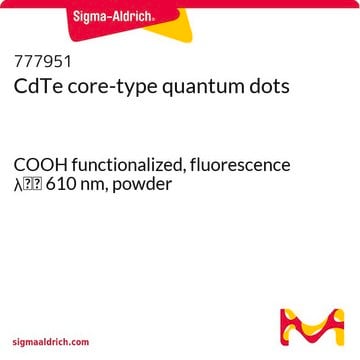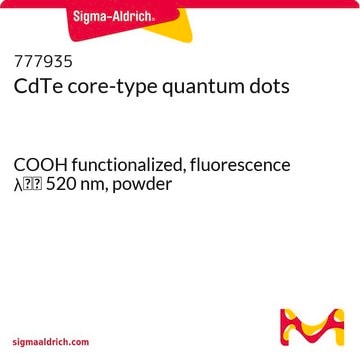900221
CdSe/ZnS core-shell type quantum dots
carboxylic acid functionalized, fluorescence λem 540 nm, 1 mg/mL in H2O
Synonym(s):
Fluorescent nanocrystals, QDs
Sign Into View Organizational & Contract Pricing
All Photos(1)
About This Item
Linear Formula:
CdSe/ZnS
UNSPSC Code:
26111700
NACRES:
NA.23
Recommended Products
form
powder
Quality Level
concentration
1 mg/mL in H2O
fluorescence
λem 540 nm
λem 540 nm±10 nm, quantum yield >50%
functional group
carboxylic acid
storage temp.
2-8°C
Looking for similar products? Visit Product Comparison Guide
General description
Reactive group: Carboxylic acid.
Application
The organic layer of the CdS/ZnS or CdSe/ZnS quantum dots (QDs) with carboxylic acid as reactive group consist of a monolayer of oleic acid/octadecylamine and a monolayer of amphiphilic polymer. The total thickness of organic layers on these QDs is approximately 4 nm. They find many applications in bioimaging and biosensing.
Caution
Do not freeze.
Legal Information
Product of Ocean Nanotech, LLC.
Hazard Statements
Precautionary Statements
Hazard Classifications
Aquatic Chronic 2
Storage Class Code
12 - Non Combustible Liquids
WGK
WGK 3
Flash Point(F)
Not applicable
Flash Point(C)
Not applicable
Choose from one of the most recent versions:
Already Own This Product?
Find documentation for the products that you have recently purchased in the Document Library.
Qingjiang Sun et al.
ACS nano, 3(3), 737-743 (2009-03-25)
Owing to their narrow bright emission band, broad size-tunable emission wavelength, superior photostability, and excellent flexible-substrate compatibility, light-emitting diodes based on quantum dots (QD-LEDs) are currently under intensive research and development for multiple consumer applications including flat-panel displays and flat
Zhanao Tan et al.
Nano letters, 7(12), 3803-3807 (2007-11-03)
We report a multilayer solution-processed blue light-emitting diode based on colloidal core/shell CdS/ZnS nanocrystal quantum dots (QDs). At a low-operating voltage of 5.5 V, the device emits spectrally pure blue radiation at 460 nm with a narrow full-width-at-half-maximum bandwidth of
Bright, multicoloured light-emitting diodes based on quantum dots.
Sun Q, et al.
Nature Photonics, 1, 717-722 (2007)
Articles
Cadmium-free quantum dots for bioimaging offer design and synthesis strategies, enhancing bioimaging and sensing applications.
Our team of scientists has experience in all areas of research including Life Science, Material Science, Chemical Synthesis, Chromatography, Analytical and many others.
Contact Technical Service
